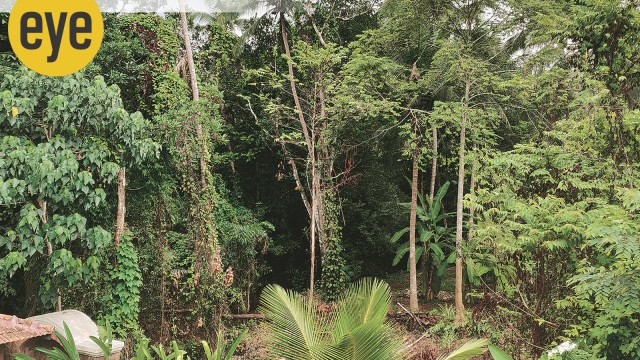Author Nilanjana S Roy’s artistic friendship with Margaret Mascarenhas, set against the backdrop of Goa rains
My first monsoon in Goa marked the beginning of a friendship that lasted for over a decade
 Maggie showed me the hidden places of Goa and we sworn never to reveal them to builders, tourists or marauders. (Credit: Nilanjana S Roy)
Maggie showed me the hidden places of Goa and we sworn never to reveal them to builders, tourists or marauders. (Credit: Nilanjana S Roy) It moves across Goa’s skies like a living creature, a benign but supremely powerful cloud-monster with a thousand grey heads, massed above emerald green fields. I’m out on the ferry when the rain sheets down, transforming the world into glistening silver sheets of water, and like everyone else on the boat (except for one lady who will not risk her crisp, flowered dress, her church shoes), I step out onto the open deck to greet it.
Drenched to the skin. Soaked. My palms upturned to receive the blessing of rain, an electric, mindless happiness thrumming through my body. Raindrops on the skin, joy welling up in the heart.
That monsoon season, my first in Goa, marked the beginning of a friendship that lasted for over a decade. Margaret Mascarenhas, who lived in the quiet village of Carona, had set up a residency for writers and artists in her second home in the even quieter village of Kalvi (Calvim), which I’d borrowed for a summer. Maggie was a multitude: writer, artist, curator, dogmother, her spirit free and fierce, one of those who gathered life and friends to her with open hands. After that summer, she called me back to Goa. “We’re going to be friends,” she informed me. “You’re too quiet and I’m too loud so clearly it’s meant to be.”
We greeted the start of the formal monsoon in her home, out on the red balcao at the first sign of the rain, the dogs splashing through puddles in the garden and chasing small frogs that they never caught. We leaned out through the oyster shell windows to let the rain cup in our hands, cooking, laughing, humming monsoon ragas and tossing snatches of poetry by Jeet Thayil, Tishani Doshi and other friends back and forth as if we were summoning them to the table, too. On long drives from Olaulim to Salvador del Mundo, we chased the monsoon along the swollen rivers.
Maggie always had so much to do, a prison art programme to run, a stranded author or artist to rescue, travels to Venezuela or Portugal, or around the last undiscovered, gorgeous landscapes of her beloved Goa, the hidden places, the wildernesses and riverfronts that she showed me after we’d both sworn an oath never to reveal them to builders, tourists, marauders.
I made her relinquish the sanctuary of her sleek little red car and took her off on long, muddy walks across the rice paddies and up hills where the red woundlines of the strip miners had not yet reached. We spent a morning watching a family of otters play and battle, snarling and plunging, hard to tell what was love, what was aggression, like most families.
On the way back to her house, we stopped at the edge of the riverbank. Two black cobras danced ahead in the road, their bodies entwined, making love with such tenderness and passion that we both stood absolutely still, silent, awestruck. They slid into one another; they held tight, they let go, they loved and strained in the falling twilight.
Then in the blink of an eye, they were done, and gone, sliding into the bushes, just a ripple of green ferns, a sway of leaves. We took the ferry back, still silent.
As Maggie ran up the steps, she said, “One of my lovers was like that. Unbelievably romantic, but once he’d slithered off, he’d slithered off.” The rain roared and drummed on the tiles of my bedroom all night, and I watched the monsoon in the square of the skylight, needles of rain coming straight at me, paused by the glass.
The years passed, the friendship deepened, then the cancer arrived. Maggie took it with her usual courage, but sometimes courage isn’t enough. I spent time with her in Panjim, where a hospital bed seemed entirely the wrong setting for my friend, who fitted best on a dance floor, dominating a dinner table, out exploring the backwaters. We talked for a long time. We knew the sands were running out, but what she wanted to talk about most was the astonishment of life, its pleasures, its vast joys. “My life,” she said, “has been a feast.” Her voice was a whisper; I stood up to leave, and she took my hand in a surprisingly fierce grip. “Promise me that you’ll go to the sea first, before you go back home. Promise me, and call me from there.”
I found a quieter beach, away from Miramar. A fisherman called to me, and we rowed out in his boat as the rain started to fall, towards the line where the grey-capped waves met the sky. The ocean stretched out ahead, vast, wild, endless. And I called Maggie, as promised, and phoned the monsoon in.
Roy is a Delhi-based writer. Her most recent novel is Black River



- 01
- 02
- 03
- 04
- 05




























